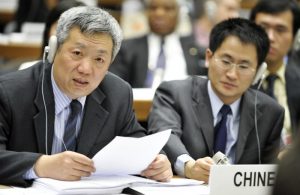Despite criticism at the Third Committee of the U.N. General Assembly on China’s human rights violations in Xinjiang, Hing Kong, and Tibet, the country on October 13 managed to win the U.N. Human Rights Council (HRC) elections with 139 votes. Before the elections, in an effort to ask member states to not elect major violators of human rights, the U.N. Director of Human Rights Watch, Louis Charbonneau, had said that China and Saudi Arabia have not only committed grave human rights violations but, at the same time, they also disregard the international system around human rights. This statement seemed to have made an impact, partially, as Saudi Arabia lost the election, managing a mere 90 votes as compared to 152 votes back in 2016, but China still made it to the council as only five Asian countries were contesting for four seats.
While China is now going to resume its membership at the HRC starting from January 2021, India opted out of supporting either bloc of countries — either those effectively acquiescing to, or standing against, China’s activities in Hong Kong, Tibet, and Xinjiang – in the recent General Assembly session of the Third Committee. (The Diplomat’s Shannon Tiezzi and Catherine Putz have mapped the countries forming these blocs.) Revisiting the list of countries in the two blocs from 2019 reveals India wasn’t involved in the matter even then.
Thus, the pertinent question is: Why did India not voice its preference, even after being cognizant of the fact that Beijing stands as a strategic hindrance when it comes to Indian interests at the United Nations?
This stance of not highlighting human rights violations committed by any country at the international forum is not atypical of New Delhi. Back in 2019, in an interview with Financial Express, analyst Bharat Karnad noted how the Indian government had shied away from bringing up human rights violations carried out by Pakistan in Balochistan. Karnad also mentioned that since India hadn’t highlighted this issue at the U.N. in the last 30 years, bringing it up right now can be difficult to justify. But keeping in mind that the U.N. Committee on the Elimination of Racial Discrimination published its report of human rights violation by China in 2018, it definitely wasn’t late for India to criticize Beijing’s actions this time around.
Speaking at the Third Committee meeting where China’s human rights record was debated, Ashish Sharma, first secretary at India’s permanent mission at the U.N. said:
While we remain continuously engaged in promotion and protection of human rights worldwide, we need an honest appraisal of whether the international community has managed to achieve genuine improvement in human rights, by undertaking aggressive and overly intrusive methods without consultation and consent of the country concerned.
Rather than interpreting Sharma’s statement as one with undertones of solidarity toward China, a more accurate read is that it reflects India’s longstanding support for the norm of state sovereignty and non-interference in domestic affairs of other countries.
However, the issue does quite resolve itself here. Rather, India’s stance – while masked in the language of the sovereignty norm – is shaped by its own domestic circumstances. In July 2019, the U.N. high commissioner for human rights raised serious concerns regarding abuses being committed by armed groups and security forces in parts of Kashmir, for which no actions were taken by the Indian government. Such reports by the high commissioner have always been termed “‘false” by New Delhi. Apart from this, recent events such as suspension of operations by Amnesty International’s India office – the organization alleges it was being “targeted” by the Indian government for criticizing the Modi government’s human rights record – show India’s prickliness when it comes to any external criticism of the state of human rights in the country.
Simply put, India’s stance on international human rights issues stems from the old adage “Those who live in glass houses shouldn’t throw stones.” China will re-join the HRC in January just as India is completing its own term there. Thus, Beijing would have good reason to criticize India’s abuses in Kashmir within the council then, if India would have tagged along in attacking Beijing’s own actions in Hong Kong, Xinjiang, and Tibet in October.
However, given that China and India find themselves at loggerheads when it comes to key Indian priorities at the U.N. – chief of which is India securing a permanent seat at the Security Council – perhaps New Delhi should not hesitate to take the fight to Beijing there when it comes to human rights and other issues, its own compulsions notwithstanding.
Arkoprabho Hazra is a Young India Fellow at Ashoka University who has completed his undergraduate studies in political science. He writes on Indian foreign policy, Rohingya refugee crisis and the Middle East. His writings have been published by South Asia Democratic Forum and South Asia Centre, London School of Economics. He tweets @ArkoprabhoH.

































